All you want to know about THC

Cannabis is a complex plant with a variety of compounds like CBD, delta-8, and many more, each contributing uniquely to its effects and benefits. THC is one of the most well-known compounds found in cannabis. Revered for its psychoactive effects, THC plays a crucial role in both recreational and cannabis-infused medical products.
This blog explores everything you need to know about THC, from its workings to its uses.
What is THC?
THC is one of the well-known chemical compounds from the marijuana plant. It was first found in the 1960s and can be thus described, probably, as the most famous and thoroughly investigated component of marijuana. THC has a rather multi-layered molecular composition, which affects the functioning of the human brain and all other organs in the body, both physically and psychologically.
THC is stored in marijuana in the most significant quantities, and its production is highest in the marijuana flowers and the top portion of the stalk. This can be saturated differently based on the strain and the techniques of cultivation applied in growing the marijuana.
How Does THC Work?
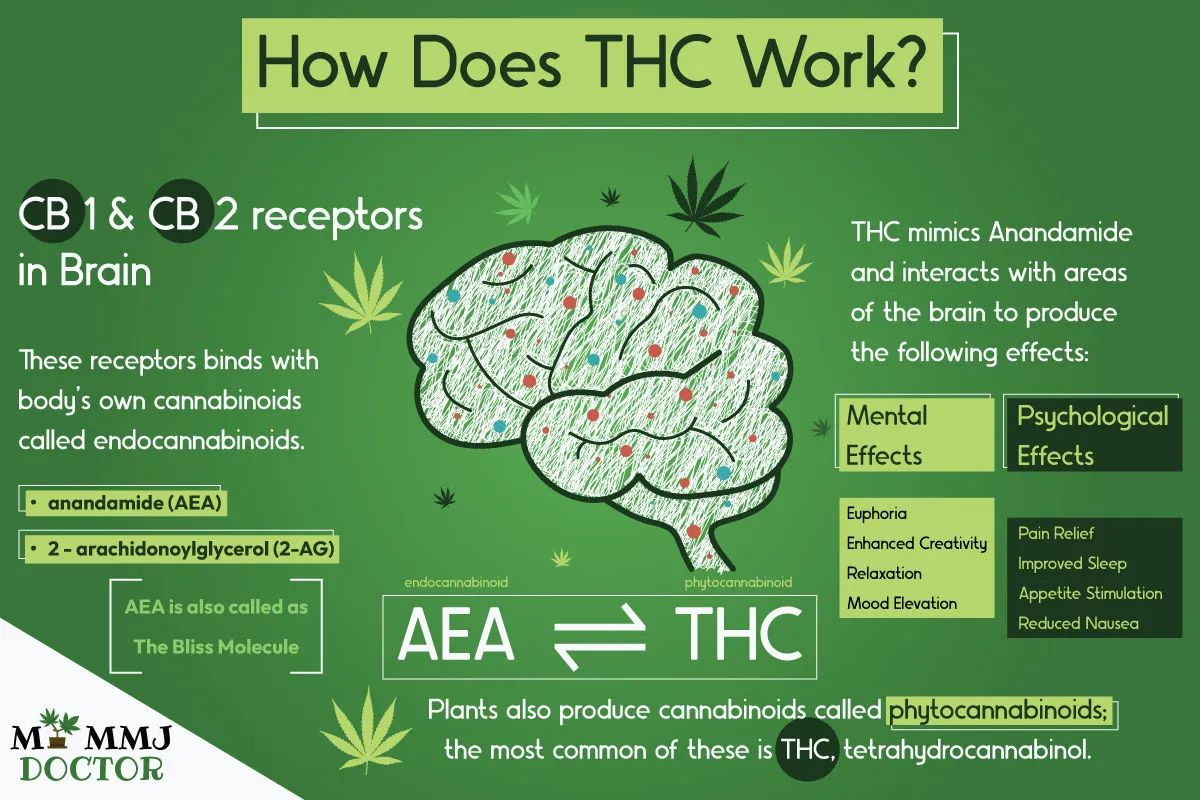
THC and the Endocannabinoid System
1. Endocannabinoids
Our bodies produce endocannabinoids like anandamide and 2-AG, which function similarly to THC by binding to CB1 and CB2 receptors. Unlike THC, anandamide positively influences mood, memory, brain function, and pain without causing paranoia or lethargy. These endocannabinoids also suppress the vanilloid receptor, which regulates pain.
2. Phytocannabinoids
These are plant-derived cannabinoids found in cannabis. These compounds also interact with the human ECS, benefiting various body systems.
What are the Medical Uses of THC?
Pain Relief
THC is renowned for managing chronic pain. This is due to its ability to affect the endocannabinoid system, which offers a mechanism for managing pain.
- Arthritis Pain: THC has an anti-inflammatory element that helps reduce inflammation resulting from Arthritis. It is also packed with analgesic qualities and has been of great help, especially in symptoms such as pain and inflammation of joints associated with Arthritis.
- Fibromyalgia: From the natural effects of THC, it aids fibromyalgia in reducing pain sensitivity, muscle tension, sleep disruption, depression, and probably inflammation as well.
- Neuropathy Pain: Neuropathy pain can be managed with the help of THC because it decreases pain sensitivity, relaxes muscles, and possibly has an anti-inflammatory effect.
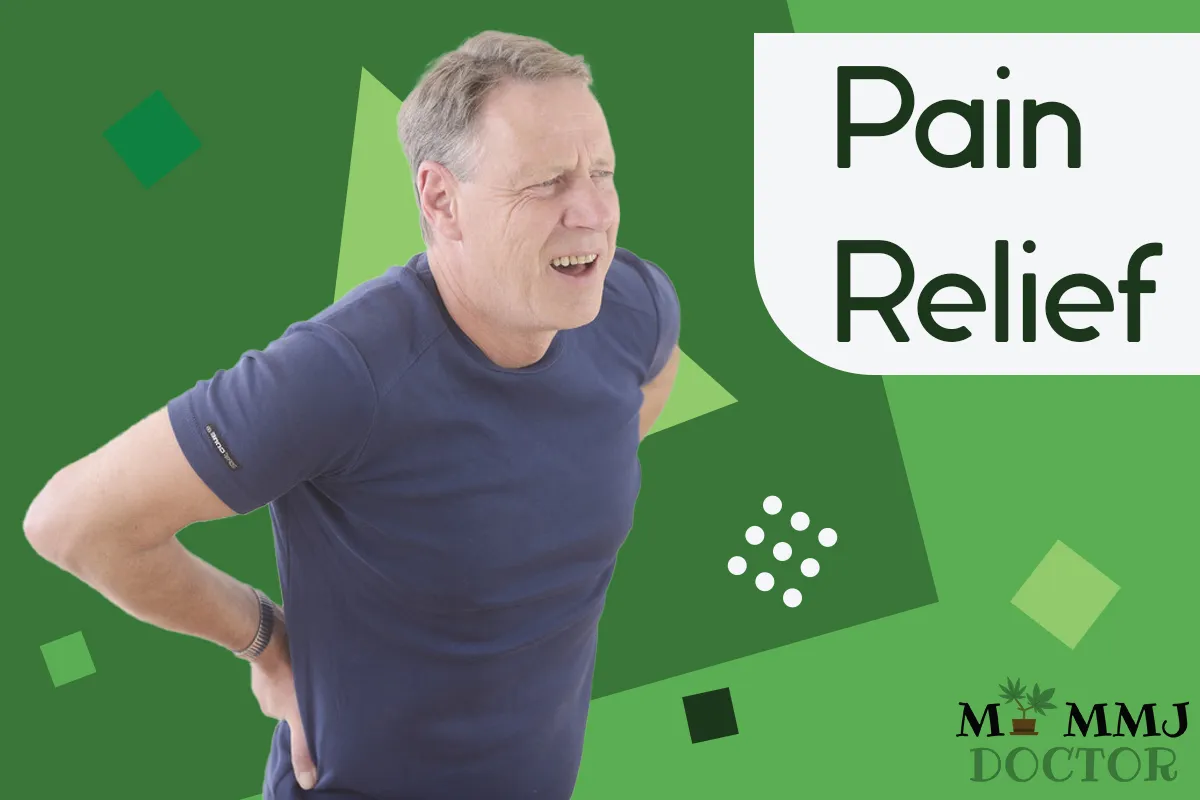
Nausea and Appetite Stimulation
THC is crucial in managing nausea and appetite loss, especially in patients undergoing cancer treatment. THC is essential in managing nausea and appetite loss, especially in patients undergoing cancer treatment:
- Chemotherapy-Induced Nausea: It also effectively alleviates the nausea symptoms caused by chemotherapy.
- Appetite Stimulation: THC stimulates appetite and protects the patient from emaciation and malnutrition.
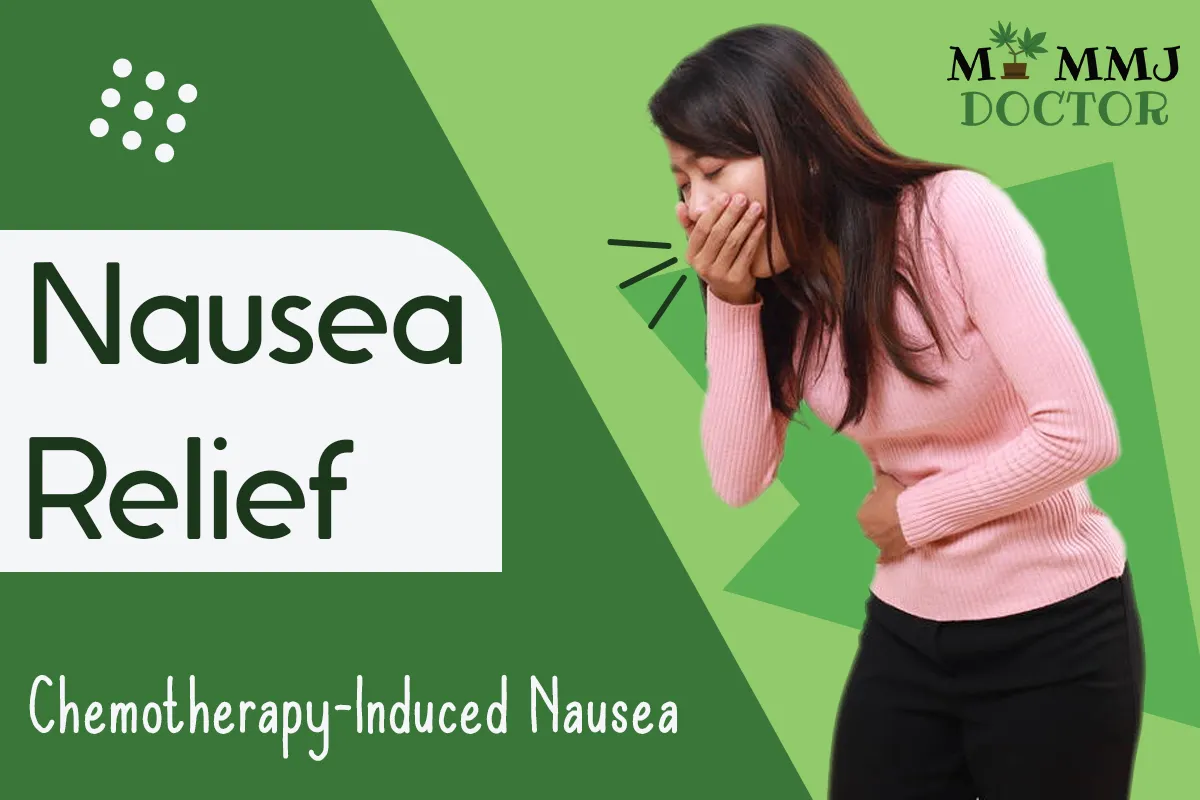
Anxiety Relief
THC can have anxiolytic (anxiety-reducing) effects when used in low doses. Many users report a sense of relaxation and reduced stress with moderate consumption of THC. However, it’s crucial to note that the relationship between THC and anxiety is complex and dose-dependent:
- Low Doses: Can help alleviate anxiety by promoting relaxation and well-being. This can be particularly helpful for individuals with social anxiety or general stress.
- High Doses: May have the opposite effect, potentially exacerbating anxiety and even inducing paranoia in some individuals. This is why careful dosing and individual sensitivity are important considerations when using THC for anxiety relief.
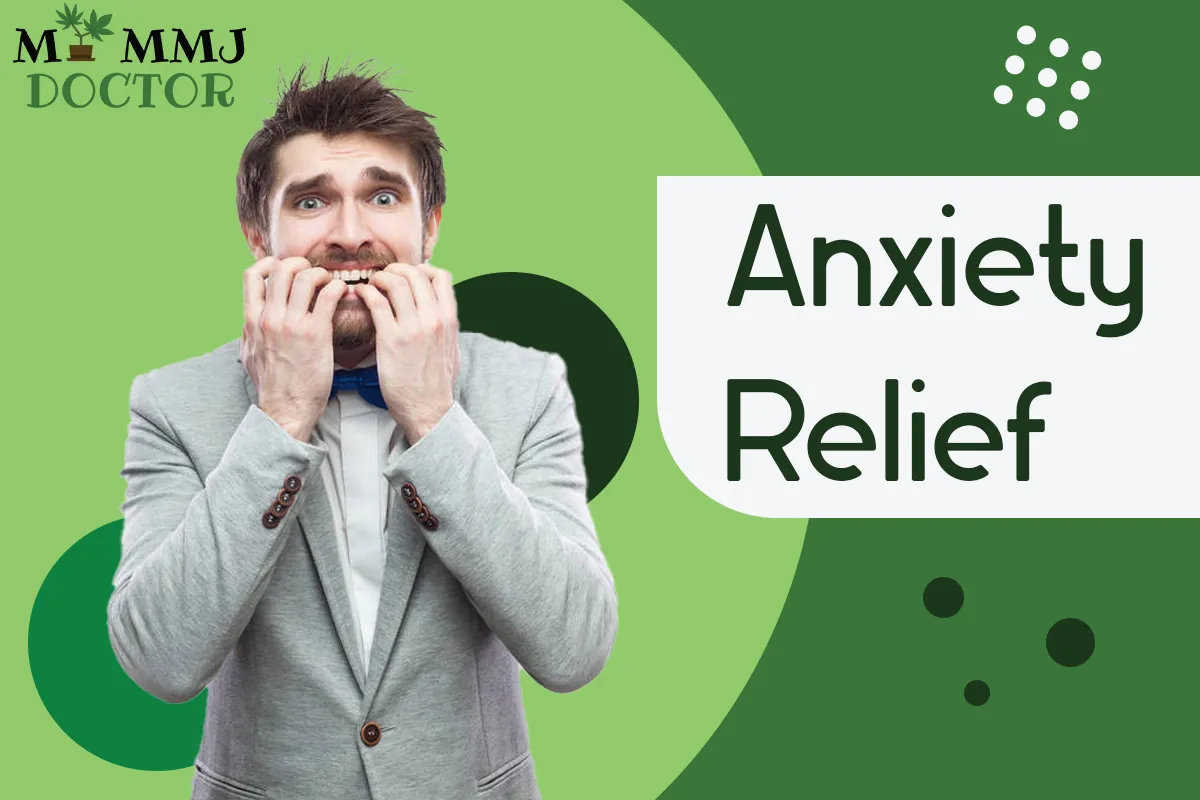
Is Recreational Use of THC Legal ?
Recreational use of THC depends on state laws in the U.S. and varies from state to state. Some states have fully legalized it, while others have strict prohibitions.
Recreationally, THC is celebrated for its ability to induce euphoria and relaxation. There are many different types and ways to use THC.
How to use THC?
Popular Strains and Products
Not all marijuana strains are the same. Some strains are better for reducing stress than others. Many cannabis strains are specifically cultivated to enhance pleasurable effects, catering to a wide range of preferences and needs. Here are a few recommendations:
- Indica Strains: Commonly used for relaxation.
- Hybrid Strains: Medium-acting strains that have properties of both Indica and Sativa cannabis strains.
- CBD-Rich Strains: Contains a higher amount of CBD and a lower amount of THC, which naturally reduces stress.
1. Edibles
Edibles are foods and beverages infused with THC (tetrahydrocannabinol), the primary psychoactive compound in cannabis. They provide a discreet and convenient way to consume cannabis without the need for smoking or vaping. The effects of edibles take longer to set in—typically between 30 minutes to 2 hours—but they last much longer than other methods, often up to 6-8 hours or more. Popular edible products include:
- Gummies and candies
- Baked goods like brownies and cookies
- Beverages such as teas and sodas
- Chocolates and truffles
2. Vaporizers
THC Legal Status in the U.S.
Federal Law:
THC is illegal as a Schedule I substance.
State Laws:
Recreational Use:
Legal in 23 states and D.C. for adults 21+.
Medical Use:
Legal in 38 states with a medical recommendation. These states include Alaska, Arizona, California, Colorado, Connecticut, Delaware, Illinois, Maine, Maryland, Massachusetts, Michigan, Minnesota, Missouri, Montana, Nevada, New Jersey, New Mexico, New York, Ohio, Oregon, Rhode Island, Vermont, Virginia, and Washington.
Restrictions:
Age Limits:
Usually 21+ years for recreational use.
Possession:
Limits vary, typically 1-2 ounces.
Does THC Get You High?
Yes, because of its psychoactive effects, THC can make you high. This effect can lead to mood changes, altered perception, impaired memory, and disturbed cognitive function. These changes can affect coordination, reaction time, and decision-making abilities, potentially impacting daily activities and overall mental health.
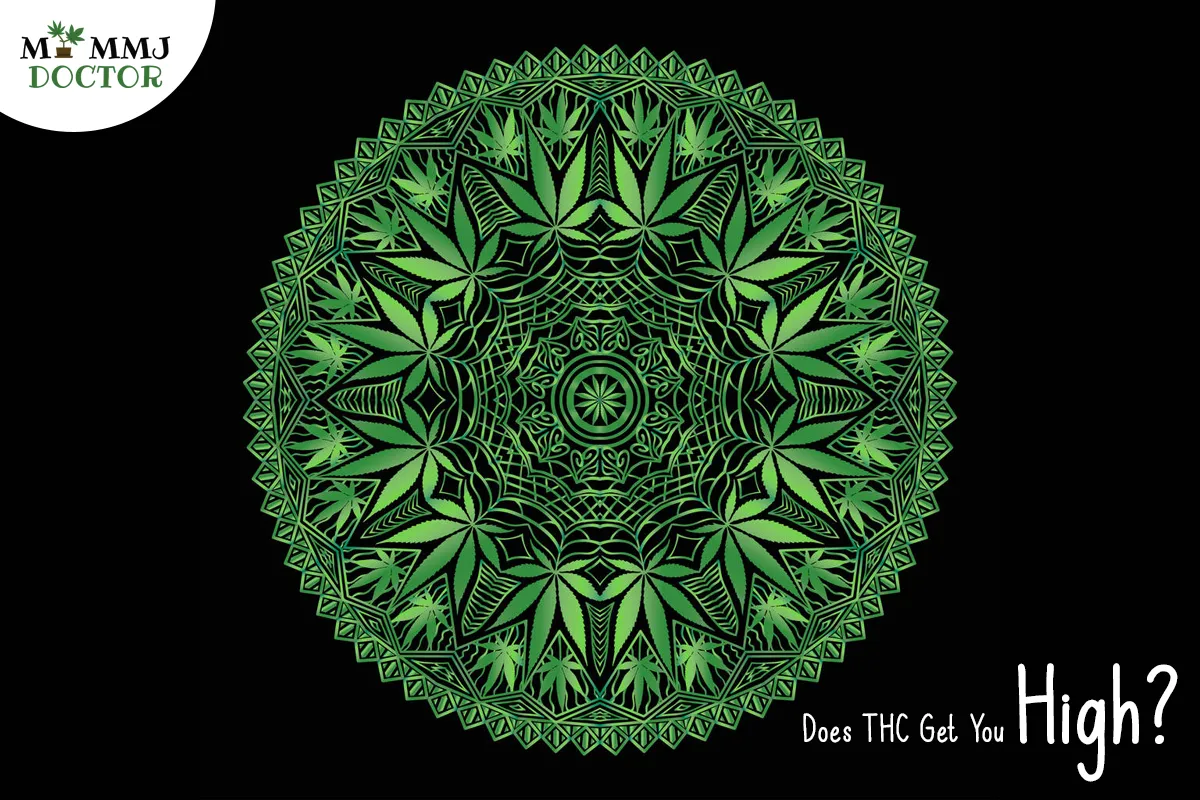
How Long Does THC Remain in the Body?
THC can be detected in the body a few days to a few weeks after use of marijuana, depending on the rate of metabolism, amounts and frequency of use. THC usually is undetectable after 2-4 days in the blood, but in chronic users, it may be found in urine for up to 30 days.
THC Vs THCA
THCA and THC are cannabinoids found in cannabis plants. However, they have distinct chemical structures and properties, resulting in varying physiological consequences. While THCA flower is non-psychoactive and needs to be transformed into THC to provide psychoactive effects, THC binds directly to cannabinoid receptors in the brain, causing you to become high. Let’s talk about THCA vs. THC.
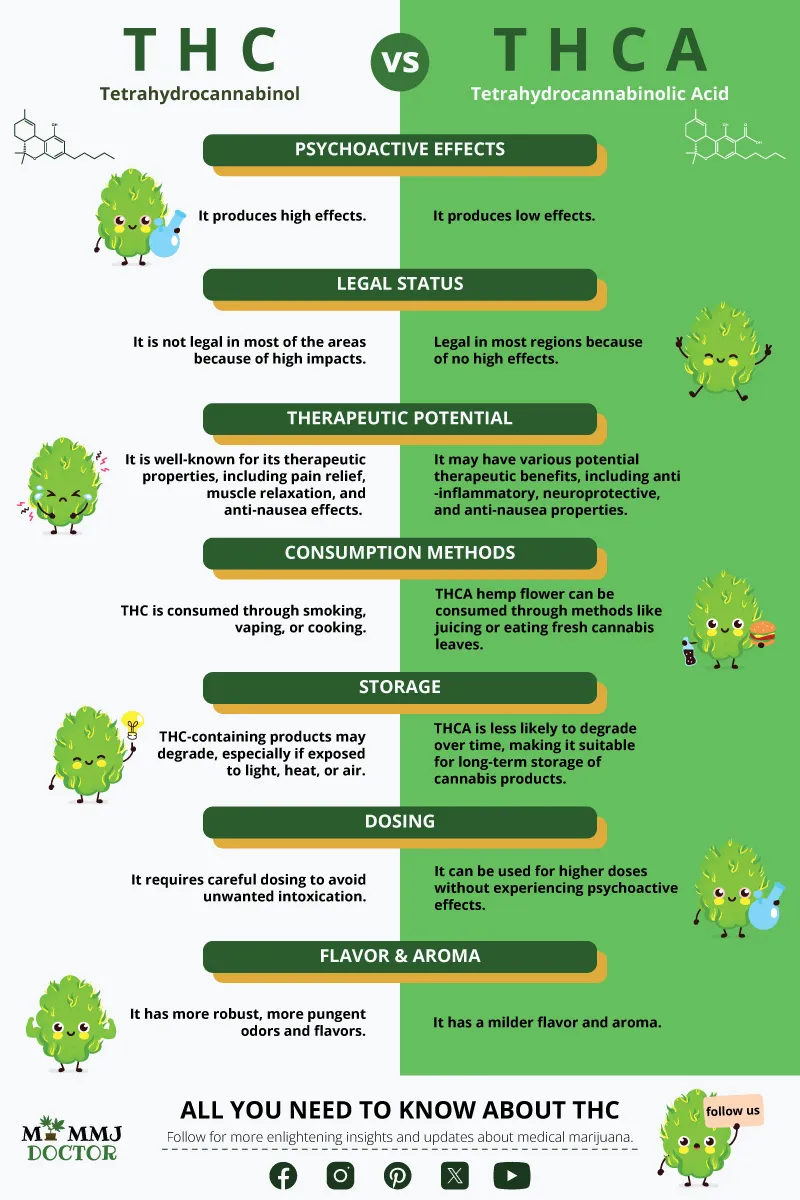
How Can an MMJ Card Help You Get THC?
1. Schedule an Appointment: Contact an MMJ physician through MyMMJDoctor.
2. Video Consultation: Discuss your condition via video call.
3. Evaluation: The doctor will provide a recommendation form if approved.
State Laws: Rules vary, so check specific state regulations.
“Now that you understand THC and its effects, you can make more informed choices about its use.”
Conclusion
THC plays a vital role in cannabis consumption that has positive effects on the health of the users as well as the recreational users. It can assist in treating several illnesses, such as PTSD, nausea, and chronic pain while on the other side, it may cause euphoria and relieve stress and anxiety. It remains in the body for several days to several weeks, depending on the usage and a person’s physical traits. THC typically withdraws from the blood in a few days, but in the urine, it can be detected for up to thirty days in power users.
Like any other substance, the use of THC varies depending on the law; therefore, people should use it wisely and observe any emerging changes in the law.
FAQs
CBD derived from Hemp typically consists of low levels of THC, which is usually even less than 0.3.
To detox yourself from THC, it’s suggested to drink plenty of water, eat a fiber-rich diet, or take a nap. This way, you can effectively detox your body.
A dime bag generally contains about 1 gram of weed, with THC content ranging from 10-20% so that it can have approximately 100-200 milligrams of THC.
THC is often used for identifying the strength of the cannabis; thus, with a THC content of 20%, at least an ounce of the substance, which is equivalent to 28 grams, should contain about 5. 6 grams of THC.
In reality, THC gummies have an expiration date since THC deteriorates with time, particularly in the presence of heat, moisture, and light. Depending on the ingredients and storage methods, they can last anything from six months to a year.
THC can help with different medical conditions including:-
- Chronic pain
- Nausea and vomiting
- Appetite stimulation
- Spasticity
- Sleep disorders
- PTSD
- Glaucoma
- Neuropathic pain
- Anxiety
- Seizures
Popular methods include consuming edibles and using vaporizers.
Low doses may alleviate anxiety, while high doses can exacerbate it.
What are the benefits of THC for PTSD management?
THC can help reduce symptoms like flashbacks and improve sleep quality.
Related Articles
How to Get a Medical Marijuana Card in Maryland?
How Can You Obtain Your Medical Marijuana Card in Maryland in 2025?Are you a Maryland resident seeking a way to manage your symptoms naturally? You came to the right place. Maryland has a medical marijuana program that allows eligible...
Benefits You Are Missing Without a Michigan MMJ Card
Top Benefits of a Michigan Medical Marijuana CardIf you live in Michigan and already use cannabis, you likely know it’s easy to access. However, many people don’t realize that having a Michigan medical marijuana (MMJ) card offers additional...
What are the Michigan Medical Marijuana Laws?
What are the Michigan Medical Marijuana Laws?Medical marijuana has been legal in Michigan since 2008, helping thousands of residents manage chronic pain, anxiety, cancer symptoms, and more. But knowing what’s allowed - and what’s not - can...



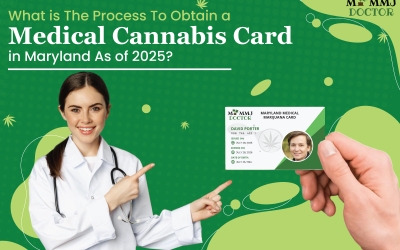

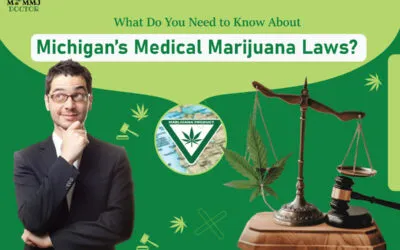
0 Comments